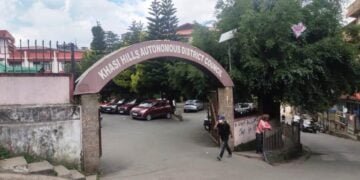Looking to get religious leaders on board in the fight against cancer, NEIGRIHMS held a consultative meeting with representatives of the major faiths and state health authorities today.
The event was organised by the Department of Surgical Oncology at NEIGRIHMS.
During the meeting, the attendees highlighted the importance of prevention as a cost-effective long-term strategy for combating cancer, and the significance of early detection and awareness of early signs and symptoms. To disseminate Information, Education, and Communication (IEC) materials effectively across the state, the proposal of utilizing videos in the local Khasi and English languages was put forward.
In the quest for community engagement, religious groups, including churches and mosques, were identified as invaluable platforms for hosting seminars focused on cancer prevention and treatment.
Furthermore, the involvement of psychologists as part of healthcare teams to provide support for cancer patients was recommended. The need for comprehensive cancer care facilities within Meghalaya, reducing the necessity for patients to seek treatment outside the region, was also emphasized.
In his opening address, Dr Nalin Mehta, Director of NEIGRIHMS, said that Meghalaya is known as the cancer capital of India and has among the highest incidences of cancer (131 per lakh population) in the country and it was therefore important to raise awareness through every available option.
Involvement of religious leaders would go a long way in this regard as they are in a position to influence the masses effectively. It was imperative, he added, to utilize all alternatives including various media channels, in formats that would impact children as well as adults.
Dr Caleb Harris, Associate Professor of Surgical Oncology, said that Meghalaya has the dubious distinction of having the highest incidence of oesophageal cancer in the country, with over 70 cases per lakh of population, which is ten times the national average. Oesophageal cancer, he stressed, is caused by the use of tobacco, alcohol and betel nut and is preventable.
Sampath Kumar, Principal Secretary and Commissioner of Health and Family Welfare, lauded the initiative and exhorted the religious leaders to use their platforms to raise awareness against tobacco, alcohol and kwai and encourage a healthy lifestyle.
Rev Fr Richard Majaw, secretary of the Shillong All Faiths Forum and Rev Edwin Harris Kharkongor, secretary of the Khasi Jaintia Christian Leaders Forum, said that to bring about a change in the mindset of the people, we need to project good role models who stand against tobacco, alcohol and kwai.
The meeting was attended by representatives of the Central Puja Committee, Shillong Muslim Union, Shillong Buddhist Association, Unitarian Church and various other churches. The attendees were very moved by the experiences shared by a cancer survivor and the family member of a cancer victim. It was unanimously agreed that religious places should be declared as tobacco-free zones.
























